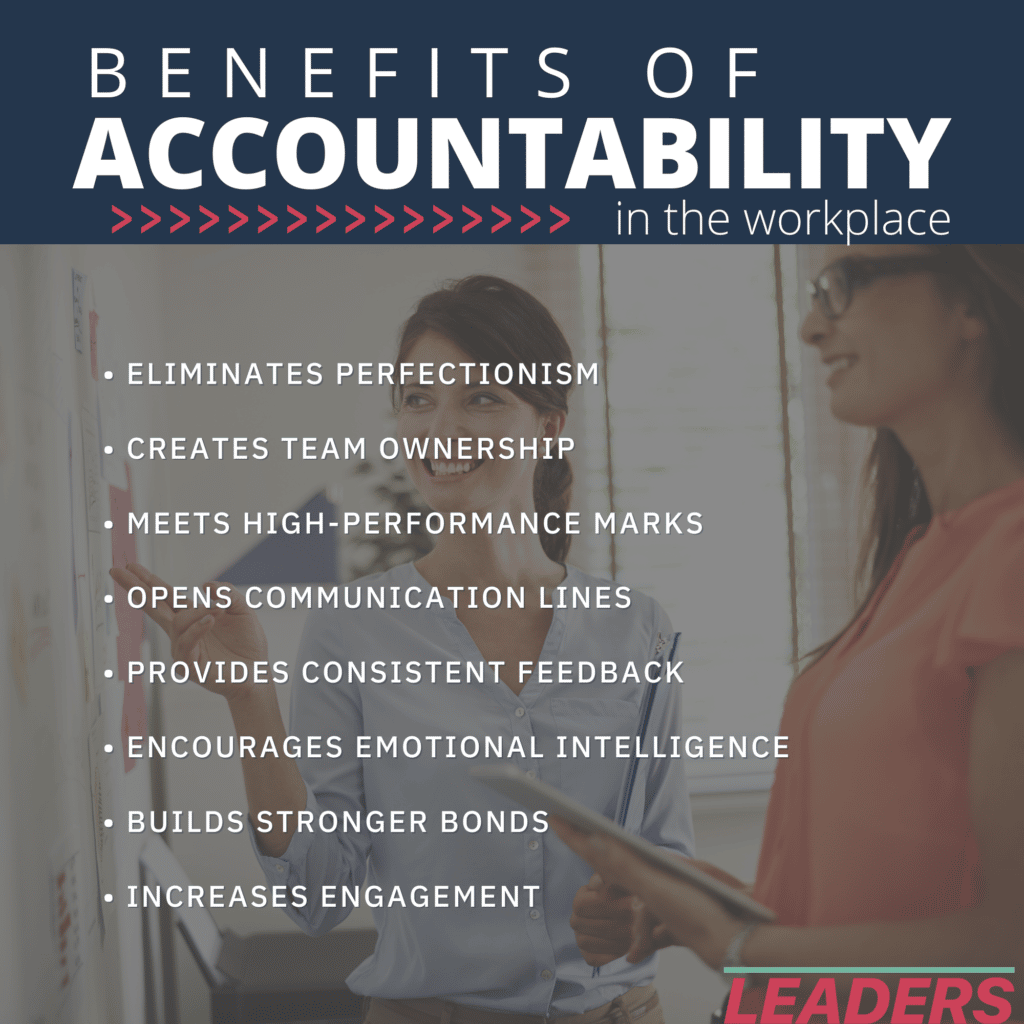“Accountability” — it’s a loaded word, but it shouldn’t be. When used as an accusation or reprimand, people shy away from it, rather than see it as one of the top leadership qualities in business. Although often misrepresented and misunderstood, lack of ownership isn’t something companies can afford to get wrong. Businesses need both accountable leaders and accountable team members. In fact, accountability is so important, the American Society of Training and Development (ASTD) found that people are “65 percent likely to meet a goal after committing to another person.” This number jumps to 95 percent with an accountability partner. This research shows team success hinges on individual team member’s personal ownership, commitment, and responsibility.
What is Accountability?
According to Merriam-Webster, the definition of accountability is: “an obligation or willingness to accept responsibility or to account for one’s actions.”
While this definition provides some insight, leadership expert and best-selling author Simon Sinek gets to the heart of accountability best. In an interview with Capture Your Flag, he explains: “We are not accountable to ourselves. We are accountable to others. As social animals, we feel a responsibility to each other.” Making excuses for behaviors and actions naturally becomes more difficult when the happiness or livelihood of someone you care about is on the line.
Why Is Accountability Important?
With this definition in mind, the impact of accountability becomes clear. Accountability is important because it builds trust, support, and bonds with people you care about. In business, a team can’t thrive without a culture of accountability, because it’s the glue that keeps everyone working together toward a collective, defined organizational mission.
As Patrick Lencioni writes in The Five Dysfunctions of a Team, “Once we achieve clarity and buy-in, it is then that we have to hold each other accountable for what we sign up to do, for high standards of performance and behavior. And as simple as that sounds, most executives hate to do it, especially when it comes to a peer’s behavior.”
The Benefits of Accountability in the Workplace
Modeling and teaching accountability as a positive and healthy part of company culture helps leaders reclaim the true concept. Instead of regarding it as a source of shame or negative criticism, the team quickly begins to understand what accountability really is, and when and how to use it.
By doing so, employers can help people change their perception of what it means to hold themselves and others accountable. As a result, the whole company reaps the benefits of ownership in the workplace, where accountability is the status quo.
For example, the benefits of accountability at work are:
- Eliminating the facade of perfectionism
- Creating a team that takes ownership of their responsibilities
- Meeting marks of high-performance
- Opening communication lines by providing consistent feedback
- Encouraging more emotionally intelligent conversations and interactions
- Building stronger bonds within the group
- Increasing engagement among individual employees

How do Companies Create a Culture of Accountability?
1. Accountability starts at the top.
Research from Harvard Business Review discovered one out of every two managers is weak in the area of accountability. When business owners and executives don’t model this behavior in an appropriate manner, employees follow suit. In Gallup’s, It’s the Manager, Jim Clifton and Jim Harter explain, “Leaders need to be the first to model these demands because their behavior dictates what employees interpret as a real expectation.”
2. Accountability increases with consistency.
Accountability requires consistent behavior and action. When repeated, ownership and accountability only become stronger. That’s why it’s so important for business leaders and their direct reports to regularly interact with one another. One-on-one time ensures employers and employees consistently receive what they need from each other. For example, this could look like setting aside 15 minutes to meet at the end of a workday for questions, support, and feedback. During these meetings, it’s the leader’s responsibility to make sure team members have what they need to succeed. Additionally, employees feel accountable for showing up to the meeting prepared with progress updates, questions, or requests for help.
3. Accountability requires ownership.
Ownership means taking responsibility for a job or task assigned, regardless of the outcome. Accountable leaders feel a sense of duty, pride, and personal ownership to the people they serve. During a TEDx Talk, leadership development expert, retired Navy SEAL and best-selling author Jocko Willink says leaders must model and teach extreme ownership. “When a team takes ownership of its problems, the problems get solved . . . Don’t make excuses, don’t blame any other person or any other thing . . . Take ownership of everything in your world. The good and the bad,” he says when defining ownership.
4. Accountability identifies mistakes and lessons learned.
Taking ownership, and developing accountability is a learning process. It’s not enough to say, “I was wrong” or “I made a mistake.” This should always be followed with a lesson learned and a plan for improvement moving forward. In Dare to Lead, Brene Brown says accountability is one of the top 10 common issues leaders cite as problems in their organizations due to “too much shame and blame” and “not enough learning.” Instead, having honest, vulnerable conversations around owning issues helps people hold themselves and others accountable.
When practicing accountability, ask:
- What went wrong or what needs improvement?
- Why?
- How can this problem be avoided in the future?
- What is the action plan to solve the issue?
When moving forward, make sure behaviors, words or actions align with the developed plan. If they don’t, this is the time to hold one another accountable.
5. Accountability builds strong teams.
Teams without accountability struggle with unsolved problems and unhealthy behavior like throwing blame around. Additionally, those who don’t feel responsible for their work have nothing motivating them to perform at a high level. Ultimately, when one or more team members aren’t accountable, it negatively affects the group as a whole. However, the same can’t be said about team cultures that prioritize ownership and accountability. When there’s a collective mentality of learning from mistakes, problem solving, pivoting with ease, performing to the best of each person’s abilities, and working in alignment with others, teams thrive.
6. Accountability needs defined expectations.
When setting KPIs or other measurable company goals, it’s important for team members to know what’s expected of them. One of the best ways leaders can encourage employees’ sense of ownership and accountability is to set clear guidelines for success. Without defined deadlines and expectations, there can be no accountability because people don’t know what they’re supposed to be achieving. As a result, strategic implementation falls to the wayside.
When setting performance measures consider:
- Identifying what success looks like
- Explaining how, when and why performance is measured
- Listening to the team’s feedback on realistic, achievable goals
- Using OKRs instead of KPIs
- Recognizing and showing employee appreciation for goals met
- Scheduling weekly check-in
Accomplishing Greater Outcomes
Accountable people don’t let their mistakes define or defeat them. At the end of the day, their main objective is learning how to produce positive outcomes. It’s this mindset of strength that makes accountability a top leadership quality.
Best-selling author Michael Hyatt says that accountable leaders constantly keep the ball rolling toward improvement and better results. “Victims are passive. They are acted upon. Leaders are active. They take initiative to influence the outcome,” he writes in a blog on his website about demonstrating this top leadership trait.
Interested in growing accountability among yourself and others? Start by diving into:
- Extreme Ownership by Jocko Willink
- How Successful People Lead by John C. Maxwell
- Leaders Eat Last by Simon Sinek
- Measure What Matters by John Doerr
Learn more about the traits and qualities effective leaders need by reading the articles below, next:
Leadership Traits: 7 Characteristics of a Multiplying Leader
